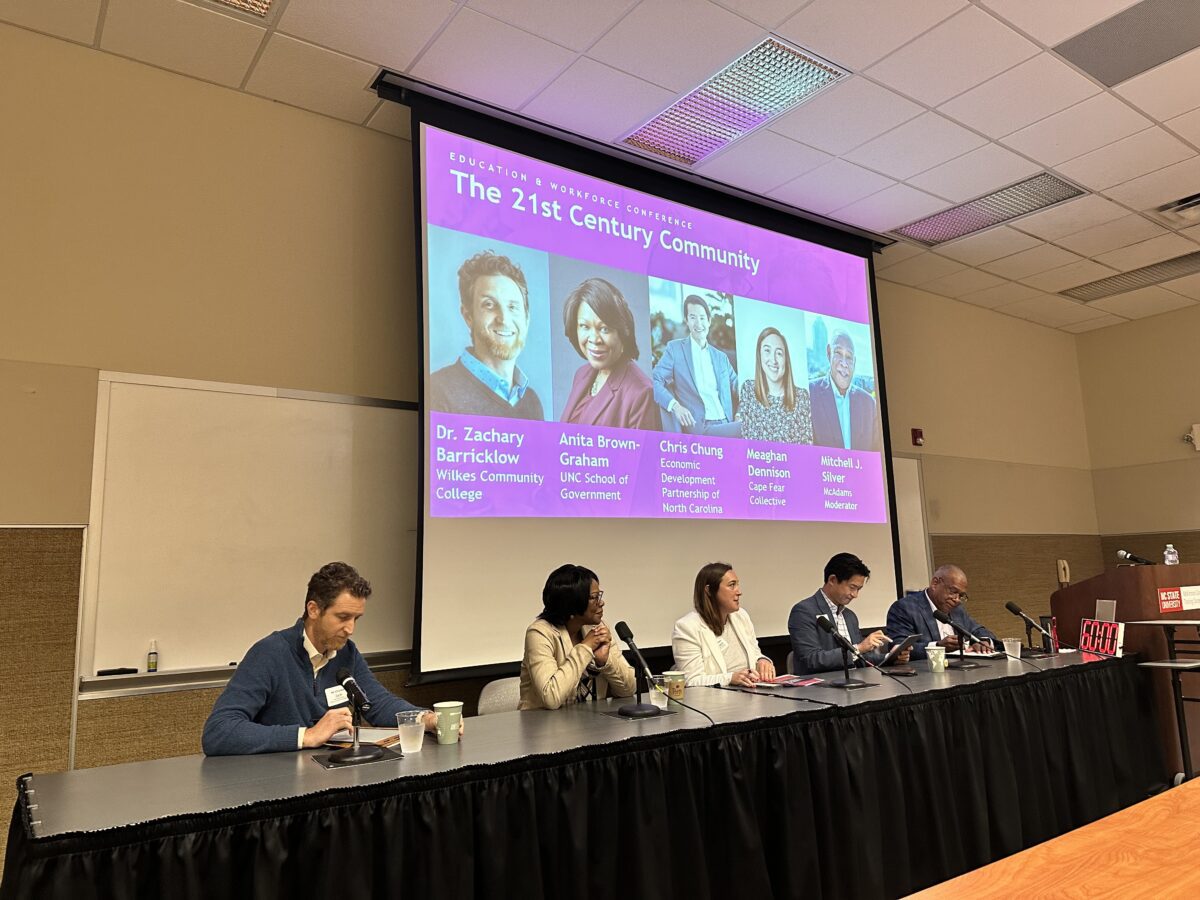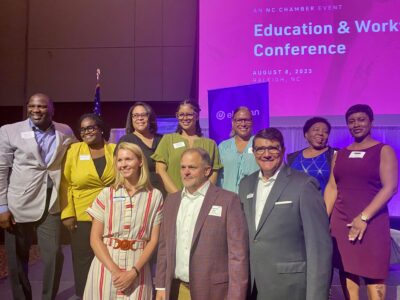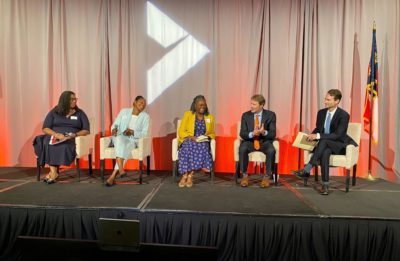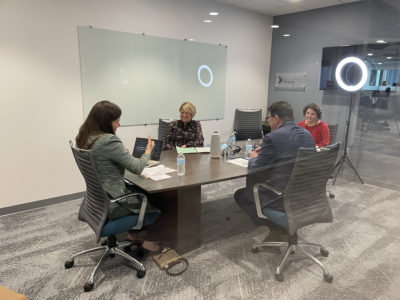
|
|
At an N.C. Chamber event held last month, experts explored the best ways to address the impact of technological advancements and demographic changes on education while ensuring that both the needs of students and employers are met, particularly in the aftermath of the pandemic.
One panel in particular focused on the 21st century community. The following individuals spoke:
- Anita Brown-Graham, founder and director of the ncIMPACT Initiative at the UNC School of Government
- Chris Chung, CEO of the Economic Development Partnership of North Carolina
- Dr. Zachary Barricklow, vice president of rural innovation at Wilkes Community College
- Meaghan Dennison, CEO of Cape Fear Collective
According to moderator Mitchell J. Silver, principal of urban planning at McAdams, the combination of population and economic growth is expected to lead to significant changes in North Carolina in the 21st century.
This can be seen in two important ways, including urbanization and the impact on agriculture.
As more people move to North Carolina, especially in the metropolitan areas, it is likely that the state will become increasingly urbanized. This means that the landscape will see more development in the form of housing, commercial spaces, and infrastructure.
“Who lives downtown? Who lives in the suburbs? Who gets left in the more remote places in North Carolina? I think that’s a social challenge that we’re going to have to spend some time thinking about,” Brown-Graham said.
“What we don’t want is a geographically unequally prosperous North Carolina, nor do we want the same dynamic playing out at a national level,” Chung said.
As the state’s population grows, there will also likely be increasing demand for agricultural products and land, which may lead to changes in the state’s agricultural landscape. This could mean more commercial farming and the loss of smaller family farms, as well as changes in the types of crops and livestock that are grown.
“It looks tremendously different than the mix of companies did before the pandemic,” Chung said. “Today the companies we talk to are overwhelmingly industrial in nature.”
During the discussion, Chung highlighted that, “North Carolina is seeing a rise in manufacturing, distribution, and food processing industries.” He also emphasized the influence of remote work, which has shifted the demand companies have for a physical office space.
Fueling progress
Economic growth in North Carolina can have significant impacts on students in various ways, both positive and negative. Here are some examples:
- Increased job opportunities: Economic growth can lead to job creation in various sectors. Additionally, the growth of certain industries can create career pathways that may be of interest to students, such as technology, health care, or renewable energy.
- Improved education funding: Economic growth can also result in increased tax revenue for the state, which can be used to fund education. This could mean more funding for schools, better facilities, and more resources for students and educators.
- More opportunities for research and innovation: With economic growth, there is often an increase in research and development in various fields. This can create opportunities for students to get involved in research projects and gain practical skills that can be valuable in their future careers.
- Higher living costs: On the other hand, economic growth can also lead to higher living costs, particularly in terms of housing and transportation. This can make it harder for students who are already facing financial challenges to afford basic necessities. Additionally, growth in certain industries, such as tourism, can lead to an increase in demand for part-time and low-wage jobs, which may not provide enough income for students to support themselves.
As rural areas continue to change and grow, there are important questions that local leaders must consider, including how to ensure that long-time residents have access to new job opportunities and how to balance growth with preserving local culture and traditions. These challenges are important to address in order to create a more equitable and sustainable future for these communities.
“How do we manage rural gentrification? How do we make sure that folks who have been in these communities have access to the jobs, career opportunities, and career mobility that is now available to them?” Barricklow said. “The community of the future really is being intentional about everyone having a part and place in that reality.”
Whether the impact on students is positive or negative depends on the specific circumstances.
However, with proper management and policies in place, panelists argued, the benefits of economic growth can outweigh the challenges and create more opportunities for students to succeed in their academic and professional lives.
Adjusting to a new normal
During the pandemic, Brown-Graham said she was concerned about the significant rise in the number of students who have become disconnected from school.
“The number of disconnected, or opportunity, youth within North Carolina tripled in two months,” Brown-Graham said. “A lot of these young people have gone back to work. Not as many have gone back to school, which is interesting.”
She found this trend particularly interesting, as education is widely considered a pathway to better job opportunities and financial stability.
To address this issue, the panelists emphasized the need for targeted efforts to re-engage opportunity youth, such as mentoring programs, job training initiatives, and support services for mental health and well-being.
With the advancement of technology and the introduction of artificial intelligence, employers are watching the workforce drastically shift in months rather than years.
“It has to be a mindset of continuous education,” Barricklow said. “Our systems need to adapt, and as we prepare for our next generation, we need to instill that mindset.”
Barricklow suggests we need to break away from the traditional belief that education is restricted to the early years of life, and then we stop learning. He says we should be open to the idea of continuous learning, which means acquiring new skills, knowledge, and experiences throughout our lifetime.
There are several reasons why continuous learning is important. First, it allows individuals to adapt to the ever-changing job market and remain relevant in their chosen professions. Second, it broadens one’s knowledge and perspectives, leading to personal and professional growth. Third, it increases employability and earning potential. Lastly, it can enhance one’s quality of life by providing opportunities for learning new things that promote creativity and personal fulfillment.
Since the combination of population and economic growth is likely to have significant impacts on North Carolina throughout the 21st century, it will be important for policymakers, developers, and residents to be mindful of the potential impacts and work to mitigate negative effects while also planning for future growth and development.
According to Brown-Graham, it is best for the community itself to determine what it needs since outsiders may not have enough knowledge about the local context to provide an answer to these questions. Other panelists agreed about the importance of centering community.
“That connection is rooted in your community. When I think about community growing roots in your community, I think about ownership of assets: of generation wealth, of your home, of your car, of your career path, of the trajectory of your family, of the ability to have upward economic mobility,” Dennison said.
While population growth can bring economic benefits such as job creation and increased tax revenue, it can also create challenges such as strains on infrastructure and public services, housing affordability issues, and traffic congestion. Some residents may also be concerned about the impact of growth on the environment and quality of life in their communities.
“I think as long as we can build towards a future where more folks have ownership of where they live, and a future for them and their household,” Dennison said. “I think that will be a great 21st century community.”





